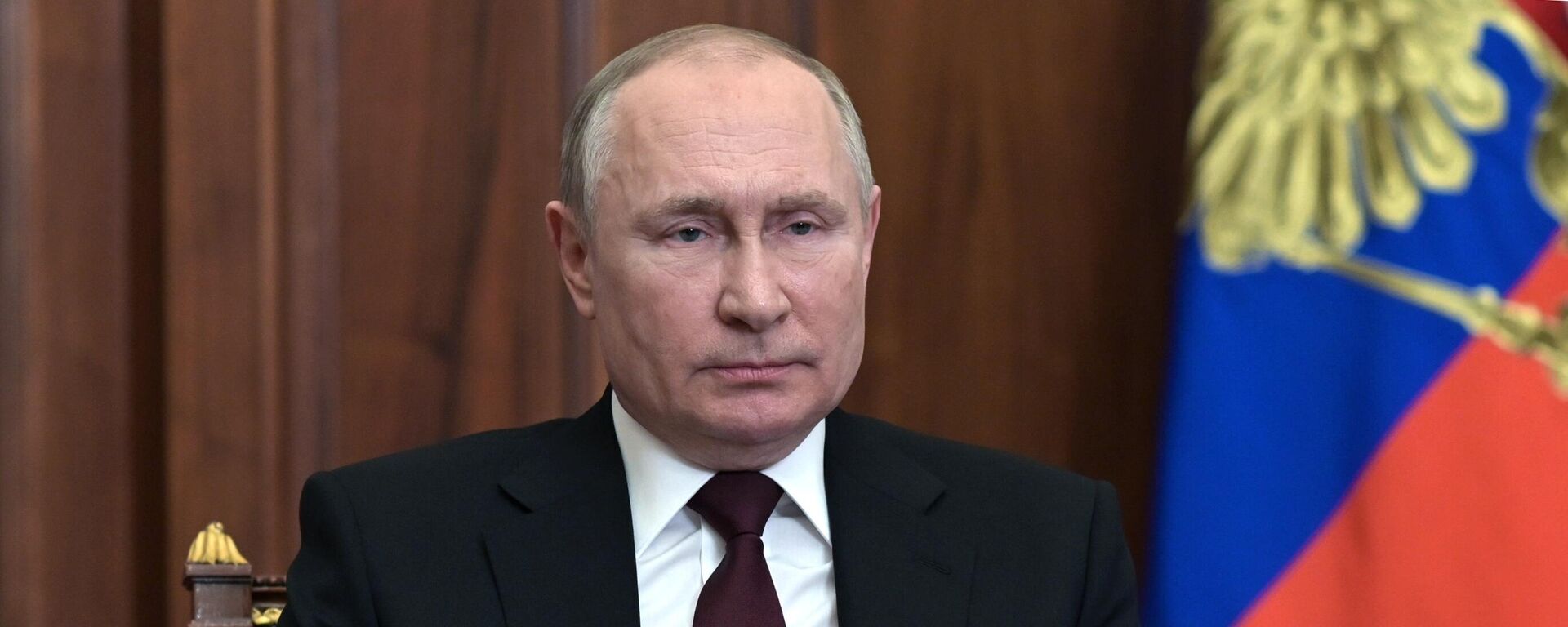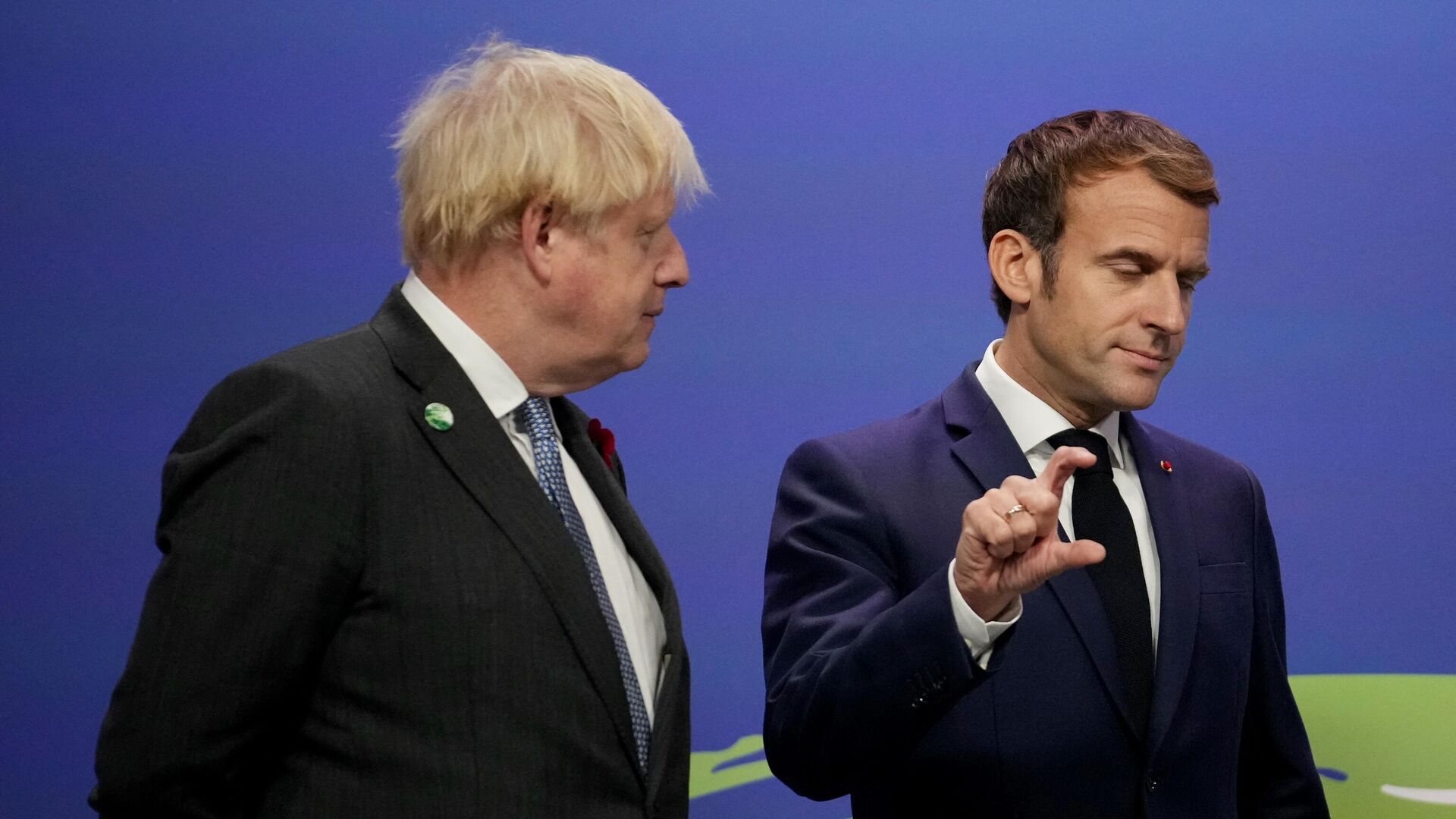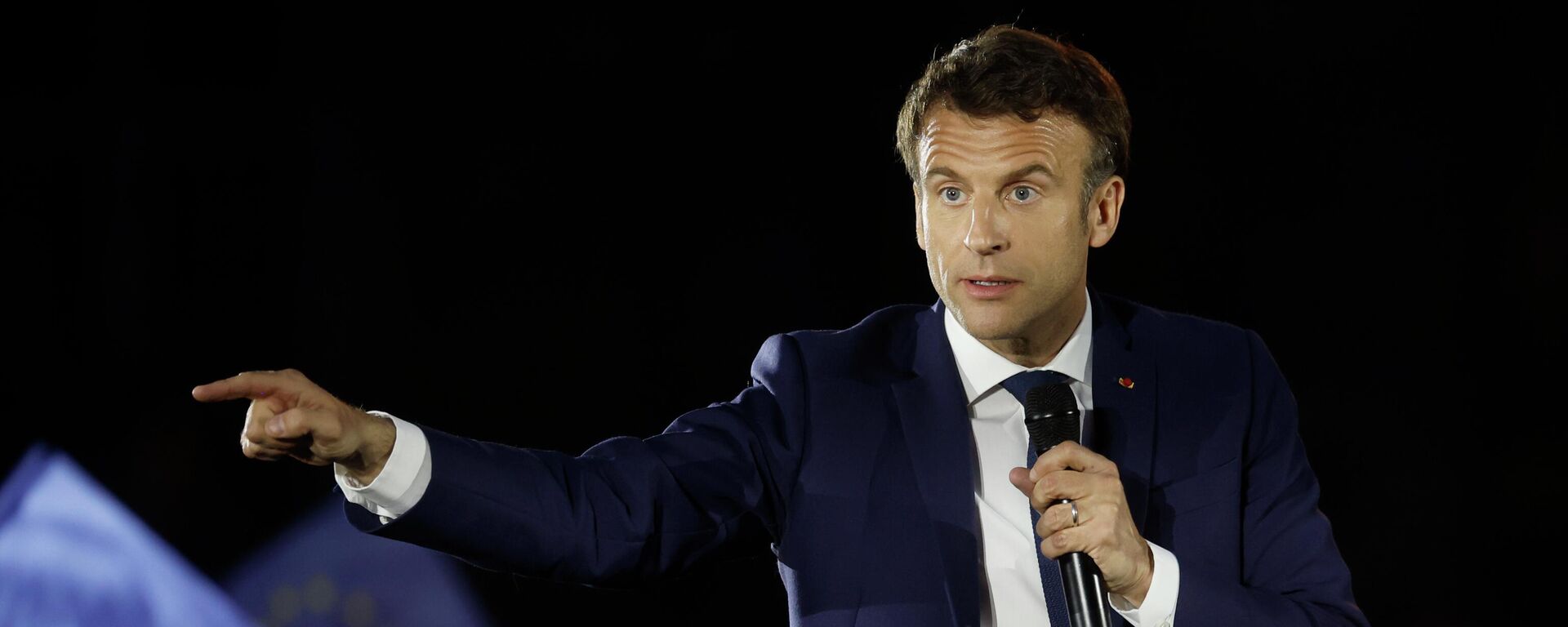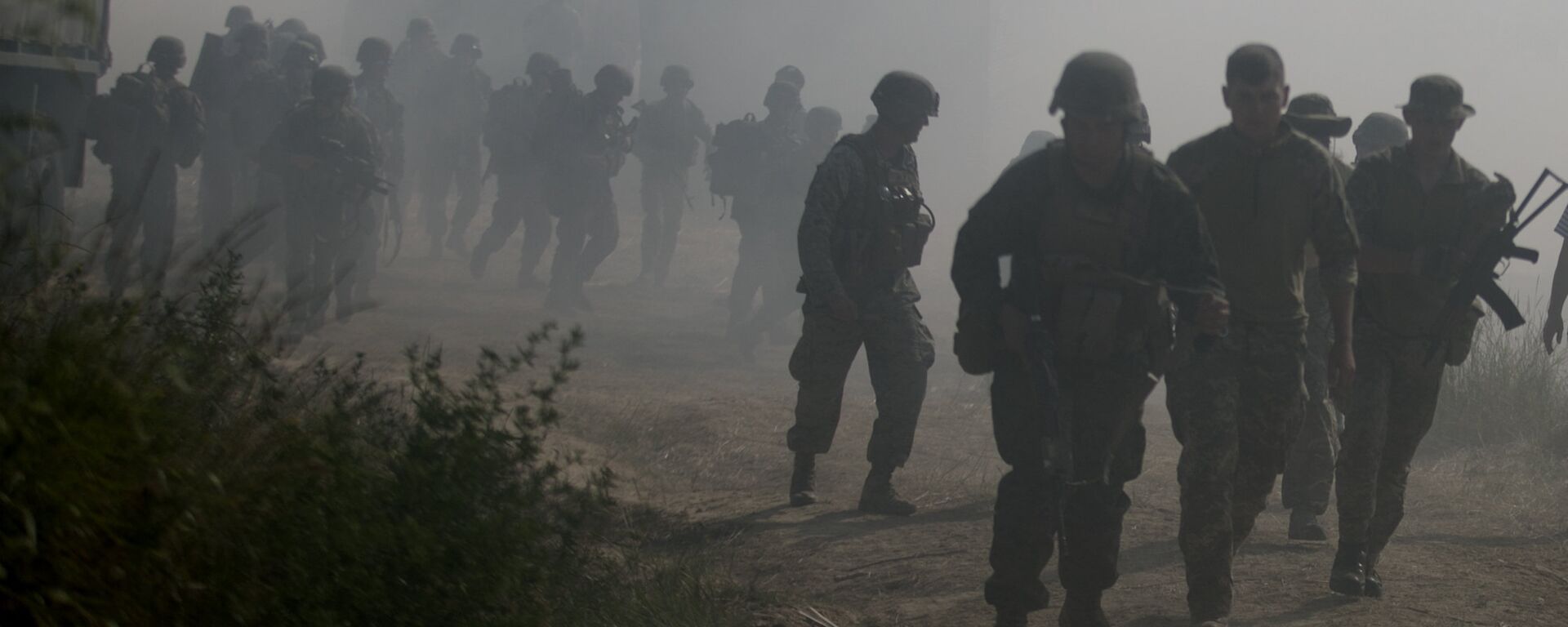https://sputnikglobe.com/20220627/bojo-reportedly-warned-macron-brokering-peace-deal-over-ukraine-would-cause-enduring-instability-1096691464.html
BoJo Reportedly Warned Macron Brokering Peace Deal Over Ukraine Would Cause ‘Enduring Instability’
BoJo Reportedly Warned Macron Brokering Peace Deal Over Ukraine Would Cause ‘Enduring Instability’
Sputnik International
Ever since Russia launched its special operation to demilitarize Ukraine, French President Emmanuel Macron and his Russian counterpart, Vladimir Putin, have... 27.06.2022, Sputnik International
2022-06-27T07:21+0000
2022-06-27T07:21+0000
2022-06-27T07:31+0000
russia's special operation in ukraine
ukraine crisis
emmanuel macron
boris johnson
vladimir putin
https://cdn1.img.sputnikglobe.com/img/07e5/0b/02/1090404990_0:0:3071:1728_1920x0_80_0_0_e8b3d74e28c11b2aa845d124c0df4b14.jpg
Boris Johnson used his meeting with Emmanuel Macron on the sidelines of the G7 summit to warn the French leader against seeking a negotiated settlement to the Ukraine conflict at the present time, reported UK media outlets citing Downing Street.Both leaders concurred that they were currently witnessing a “critical moment for the course of the conflict” and that there appeared to be an “opportunity to turn the tide in the war.”However, the UK Prime Minister reportedly insisted any peace deal struck now would only cause “enduring instability.”Johnson had told Macron such a move would “give [Russian President Vladimir] Putin license to manipulate both sovereign countries and international markets in perpetuity,” according to British media reports of the meeting between the UK and French leaders on Sunday.Both Macron and Johnson had “reaffirmed their strong determination to support Ukraine in the defense of its sovereignty and territorial integrity, and to prepare the reconstruction of the country,” according to a cited Elysée official.At the same time, the French side added: “No, the prime minister [Johnson] did not warn the president [Macron].”‘Ukraine Fatigue’Earlier, during his visit to Rwanda’s capital, Kigali, for a Commonwealth summit, the UK Prime Minister issued a call to G7 and NATO allies to help the Ukrainians build up “strategic endurance."“My message to colleagues at the G7 and at NATO in particular is … now is not the time to settle and encourage the Ukrainians to settle for a bad peace, for a peace for which they are invited to give up chunks of their territory in return for a cease-fire,” he said at the Commonwealth Heads of Government Meeting in Kigali.Johson warned such a scenario would be “a disaster” likely to trigger Further “escalation.”In sharp contrast to the stance adopted towards the Kremlin by the US, the UK and other western allies, French President Emmanuel Macron has repeatedly spoken to his Russian counterpart by phone in an effort to broker a ceasefire and negotiations.Macron has maintained that it was imperative to continue a dialogue with Moscow.The French President said the West should not “humiliate” Russia, so that “the day when the fighting stops we can build an exit ramp through diplomatic means.” Macron had also stressed that France would play a key mediating role.Moscow launched a military operation in Ukraine on 24 February after Lugansk and Donetsk People's Republics asked Russia for assistance to defend themselves from persistent attacks by Ukrainian troops.From the start of its special operation the Russian government stated that the goal was to neutralize Ukraine's military capacity, with precision strikes being carried out against military infrastructure only.At the time, the Russian President told Emmanuel Macron that a resolution of the Ukraine conflict was only possible if Moscow's legitimate security interests are taken into account, such as recognition of Russia's sovereignty over the Crimean Peninsula, as well as demilitarization and denazification of the Ukrainian state and ensuring its neutral status.
https://sputnikglobe.com/20220603/macron-says-hes-spent-about-100-hours-on-phone-with-putin-discussing-ukraine-situation-1095986873.html
https://sputnikglobe.com/20220228/ukraine-solution-possible-only-if-russias-security-interests-are-considered-putin-tells-macron-1093454515.html
https://sputnikglobe.com/20220627/military-experts-cia--nato-commandos-deployed-in-ukraine-show-kiev-is-proxy-in-us-war-on-russia-1096682341.html
Sputnik International
feedback@sputniknews.com
+74956456601
MIA „Rossiya Segodnya“
2022
News
en_EN
Sputnik International
feedback@sputniknews.com
+74956456601
MIA „Rossiya Segodnya“
Sputnik International
feedback@sputniknews.com
+74956456601
MIA „Rossiya Segodnya“
ukraine crisis, emmanuel macron, boris johnson, vladimir putin
ukraine crisis, emmanuel macron, boris johnson, vladimir putin
BoJo Reportedly Warned Macron Brokering Peace Deal Over Ukraine Would Cause ‘Enduring Instability’
07:21 GMT 27.06.2022 (Updated: 07:31 GMT 27.06.2022) Ever since Russia launched its special operation to demilitarize Ukraine, French President Emmanuel Macron and his Russian counterpart, Vladimir Putin, have repeatedly held telephone conversations, with Paris seeking to take on the role of a "mediating power" in this conflict.
Boris Johnson used his meeting with Emmanuel Macron on the sidelines of the G7 summit to warn the French leader against seeking a negotiated settlement to the
Ukraine conflict at the present time, reported UK media outlets citing Downing Street.
Both leaders concurred that they were currently witnessing a “critical moment for the course of the conflict” and that there appeared to be an “opportunity to turn the tide in the war.”
However, the UK Prime Minister reportedly insisted any peace deal struck now would only cause “enduring instability.”
Johnson had told Macron such a move would “give [Russian President Vladimir] Putin license to manipulate both sovereign countries and international markets in perpetuity,” according to British media reports of the meeting between the UK and French leaders on Sunday.
Both Macron and Johnson had “reaffirmed their strong determination to support Ukraine in the defense of its sovereignty and territorial integrity, and to prepare the reconstruction of the country,” according to a cited Elysée official.
At the same time, the French side added: “No, the prime minister [Johnson] did not warn the president [Macron].”

28 February 2022, 15:24 GMT
Earlier, during his visit to Rwanda’s capital, Kigali, for a Commonwealth summit, the UK Prime Minister issued a call to G7 and NATO allies
to help the Ukrainians build up “strategic endurance."
“There is no question that there is a lot of Ukraine fatigue now in the world,” said Johnson when meeting with reporters, but urged the West not to encourage Kiev to settle for “a bad peace.”
“My message to colleagues at the G7 and at NATO in particular is … now is not the time to settle and encourage the Ukrainians to settle for a bad peace, for a peace for which they are invited to give up chunks of their territory in return for a cease-fire,” he said at the Commonwealth Heads of Government Meeting in Kigali.
Johson warned such a scenario would be “a disaster” likely to trigger Further “escalation.”
In sharp contrast to the stance adopted towards the Kremlin by the US, the UK and other western allies, French President Emmanuel Macron has repeatedly spoken to his Russian counterpart by phone in an effort to broker a ceasefire and negotiations.
Macron
has maintained that it was imperative to continue a dialogue with Moscow.
The French President said the West should not “humiliate” Russia, so that “the day when the fighting stops we can build an exit ramp through diplomatic means.” Macron had also stressed that France would play a key mediating role.
Moscow launched a military operation in Ukraine on 24 February after Lugansk and Donetsk People's Republics asked Russia for assistance to defend themselves from persistent attacks by Ukrainian troops.
From the start of its special operation the Russian government stated that the goal was to neutralize Ukraine's military capacity, with precision strikes being carried out against military infrastructure only.
At the time, the Russian President told Emmanuel Macron that a resolution of the Ukraine conflict was only possible if Moscow's legitimate security interests are taken into account, such as recognition of Russia's sovereignty over the Crimean Peninsula, as well as demilitarization and
denazification of the Ukrainian state and ensuring its neutral status.





